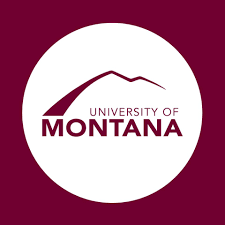
The Forestry degree is a professional program of study accredited by the Society of American Foresters. Accreditation assures students and employers that graduates with a BS in Forestry from UM have the education and technical training necessary to qualify as a professional forester. At UM, we practice and teach conservation forestry, which is the active management of forested land for a wide range of social and ecological goals.
EXPERIENTIAL LEARNING
Forestry students have many opportunities to learn, work, and play outdoors.
Field Courses
In an applied field such as Forestry, students learn best by doing. Over half of the required FCFC courses within the Forestry major include field labs. For many of these 3-credit classes, this looks like two 50-minute lectures and one three- to four-hour lab each week. We make extensive use of our university properties Lubrecht Experimental Forest and Bandy Experimental Ranch as well as lands managed by our state, federal, private, and NGO partners for field labs.
Capstone
All Forestry students participate in a capstone experience (FORS440 Forest Stand Management) that integrates program components and translates theory into practice. This is accomplished through a semester-long project where groups of students develop stand-level management plans for a partnering landowner. Through this experience, Forestry students have created a lasting legacy of active forest management in western Montana: student plans have been implemented from each of the last eight years’ classes. Management objectives vary each year, but have recently included reintroduction of fire, restoration of historic stand structure, public safety, promoting elk winter range, and promotion of the culturally-important blue camas. Student plans have met these objectives through the application of commercial timber harvest, prescribed fire, mechanical and hand treatments.
Work Experience
All Forestry students are expected to gain a minimum of 400 hours of degree-related work experience prior to graduation. For most students, this looks like a minimum of one summer of full-time paid natural resource-related work. Students are supported in their search for summer work through UM’s job board and announcements circulated through faculty and classes, as well as on-campus recruitment by regional employers.
Study Abroad
Forestry students have the opportunity to include a semester or year studying abroad. Faculty advisors work with each student to understand how courses taken at a partnering institution apply to the student’s UM-Forestry program. For most students, courses can be selected that meet Professional Elective requirements within the Forestry program. Majors in Forestry at the University of Montana also qualify for Franke Sustainability Fellowships, which fund international research and education focused on sustainability. Learn more about study abroad opportunities at UM.
Undergraduate research in the forestry degree
Opportunities for undergraduate research within Forestry include both paid and volunteer positions that often involve working with state and federal agencies and with NGOs. Explore undergraduate research opportunities at UM.
Real-world experience is brought into the classroom
UM Forestry faculty don’t just teach conservation forestry, we practice it. These real-world applications are brought back into the classroom to ground our teaching in current practice. Examples include:
Carl Sielstad, Associate Professor and Fire/Fuels Program Manager for UM’s National Center for Landscape Fire Analysis serves as a core member of the Blackfoot Prescribed Fire Working Group, coordinated through the Blackfoot Challenge, and is the burn boss for many cross-boundary prescribed burns throughout the Blackfoot watershed.
Kelsey Jensco, Associate Professor of Watershed Hydrology, is the Montana State Climatologist and through the Montana Climate Office maintains a network of sensors across the state that provides real-time weather and soil moisture information for farmers and land managers.
Beth Dodson, Professor of Forest Operations, is the statewide team leader for Montana’s biennial Forestry Best Management Practices field evaluations.
Edwin Burke, Professor of Wood Science, is the Director of the University of Montana Wood Science Laboratory, an ISO 17025-Accredited Mechanical Testing Laboratory at the University, and regularly involves students in Forest Products classes in laboratory exercises where students procure, prepare, test and evaluate performance of wood and wood-based products for industry.
Tribal Organization:
Associated tribe:
N/A
Address:
32 Campus Dr.
Missoula, MT 59812
Point of contact:
Main Office
Email:
request@cfc.umt.edu
Phone:
(406) 243-5521
0 Comments